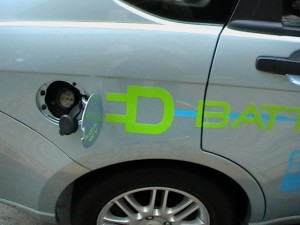
By John Addison (updated 3/11/10, original 10/26/09).
My test drive of the new Ford electric car for 2011 demonstrated that Ford is building electric cars that millions will want. The Ford Focus EV prototype provided a quiet and smooth drive for a prototype. One Ford engineer indicated that he was going beyond a 60-mile daily range in Michigan without nearing battery depletion.
The Focus EV looks and drives like the popular gasoline powered Ford Focus four-door sedan. It comfortably seated four adults, but good luck if you want three people in the back – it will help if the one in the middle is a child. This BEV will appeal to mainstream drivers that want a sedan that looks and drives like a regular car. Instead of ever visiting a gas station, they will charge in their home garage and/or at work.
This prototype was a converted Focus. It did not include the SmartGauge™ with EcoGuide display available in Ford Fusion and Mercury Milan Hybrids, nor did it include a navigation system with smart charge display user interface expected in the 2011 BEV. The final version is expected to have friendly yet sophisticated display options and some of Ford’s newly introduced telematics.
It drives with quicker acceleration than its gasoline cousin. The prototype, like the final version, had a Magna electric drive system. Unlike the final version of the Focus EV, the prototype had a Magna Steyr battery pack taking part of the trunk space. One Ford rep believed that the battery cells in the prototype were EnerDel lithium titanate. Ford will make its own packs for the 2011 commercial version using 23kWh LG Chem Compact Power lithium-ion tri-metal cells.
During my recent tour of a Johnson-Controls Saft (JCS) design and manufacturing plant, I was shown a lithium-ion 13 kWh battery with cylindrical cells for the 2012 Ford PHEV. No pricing has been announced for the Ford Focus EV. If it comes in at under $40,000 with a $7,500 tax credit, I would be interested in buying one. However, if Nissan or BYD beats Ford to the U.S. BEV market with better delivery and better price or lease rates, then they are likely to get my business over Ford.
In its drive for market share, volume, and improved profit margins, 2012 will be a big year for Ford when the company will have a common C-segment platform for a number of vehicles including the Focus, Focus C-Max, and Escape. As future gasoline price volatility causes shifts in consumer demand, Ford can quickly change its mix of what is manufactured on a common platform. For example if gasoline prices jump, Ford could increase production of vehicles with fuel efficient eco-boost and make less with conventional. Ford could also quickly increase production of electric cars.
The Focus EV will be made in America – Warren, Michigan. Ford is investing $550 million to transform its Michigan Assembly Plant into a lean, green and flexible manufacturing complex that will build Ford’s next-generation Focus global small car along with a new battery-electric version of the Focus for the North American market.
Clean Fleet Report predicts that in 2012, Ford will offer a new global Focus available with several drive systems: conventional engine, 2 liter eco-boost, electric vehicle, both hybrid and plug-in hybrid. By 2012, Ford may be using lithium-ion even for its hybrids. The vehicle will have better range because it will be lighter as Ford executes a strategy of removing 250 to 750 pounds per vehicle. Ford will be well on the way to a 35 percent fuel economy improvement over its 2005 fleet.
The new 2.0-liter, 4-cylinder EcoBoost engine will go on sale in the 2010 calendar year. It is the first EcoBoost engine to include Twin-Independent Variable Cam Timing (Ti-VCT) and will deliver a 10 to 20 percent fuel economy improvement versus larger-displacement V-6 engines. By 2012, the company plans to produce 750,000 EcoBoost units annually in the U.S. and 1.3 million globally. By 2013, Ford will offer EcoBoost engines in 90 percent of its product lineup. 2010 Focus Homepage
I get questions (or rather lectures that start with a questions), “Why would someone pay more for an electric vehicle, when you can’t even cost justify a hybrid?” First, some people make money with hybrids over comparable non-hybrids. When I bought my 2002 Prius for $20,000, I paid about $4,000 more than for a non-hybrid with similar features. Over seven years, the car saved my wife and me over $5,000 in gasoline, and then I sold it about $4,000 more than a similar non-hybrid.
While I was test driving the Focus EV in San Francisco, I saw many taxis that were Ford Escape Hybrids, Toyota Priuses, Toyota Camry Hybrids, and even a Ford Fusion Hybrid Taxi. These taxis put on 90,000 miles per year. Hybrids make the owners money by saving a fortune in fuel. New York has over 2,000 Ford hybrids in its taxi fleet.
The fact is that hybrids make money for some owners and not for others. It depends on how the cars are used and how often. In the past 12 months of severe economic downturn, Ford has increased its hybrid sales 73 percent.
Early adopters will not shell out $40,000 for an EV to save money over a sedan for less than half that cost. For mass market success, auto makers and battery makers must drive cost down the learning curve over a few years. Competition is growing for battery electric, hybrid, and plug-in hybrid car leadership. By 2020, these vehicles could represent up to 25 percent of Ford’s production – that’s 2 million cars annually with electric drive systems and advanced battery packs.
